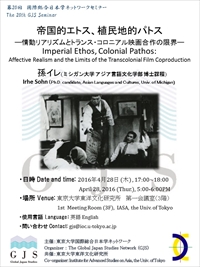The 20th GJS SeminarImperial Ethos, Colonial Pathos:
Affective Realism and the Limits of the Transcolonial Film Coproduction
| Date and time: | April 28, 2016 (Thur.), 5:00-6:00PM |
|---|---|
| Venue: | 1st Meeting Room (3F), Institute for Advanced Studies on Asia, The University of Tokyo |
| Speaker: | Irhe Sohn (PhD Candidate, Asian Languages and Cultures, University of Michigan) |
| Language: | English |

Abstract: This presentation discusses the disavowal and the re-envisioning of colonial affect in Korean cinema during the height of the Japanese empire. It examines the discourse over the “gloomy” mood of colonial Korean films produced in collaboration with Japanese filmmakers, such as The Wanderer (1937) and A Long Road to Happiness (1941). Filmmakers and critics in colonial Korea argued that Korean cinema was too gloomy and dismal to cater to a broader audience in the Japanese empire. The “dismalness” of Korean cinema would thus be replaced by a more promising mode of “cheerfulness.” Yet, this was not a simple strategy to attract non-Korean audiences; it was part of an imperial ethos to make Korean cinema, and by extension Korea, more desirable and harmonious in the multiethnic empire. Critics like Im Hwa, however, subtly expressed their anxiety that colonial pathos, which was embodied by the dismal mood of Korean cinema, would be concealed under the cheerful mode of representation. For Im, Korean cinema’s singularity should be redeemed by faces, landscapes, and stories fraught with pathos, which could exceed the imperative of an imperial ethos for cheerfulness. Attending to such contestation between imperial ethos and colonial pathos, this presentation will attempt to theorize colonial affect as an excess of imperialization and affective realism as a prescription for its cinematic embodiment.
Organizer: The Global Japan Studies Network (GJS)Co-organizer: Institute for Advanced Studies on Asia, the University of Tokyo
Contact: gjs[at]ioc.u-tokyo.ac.jp



